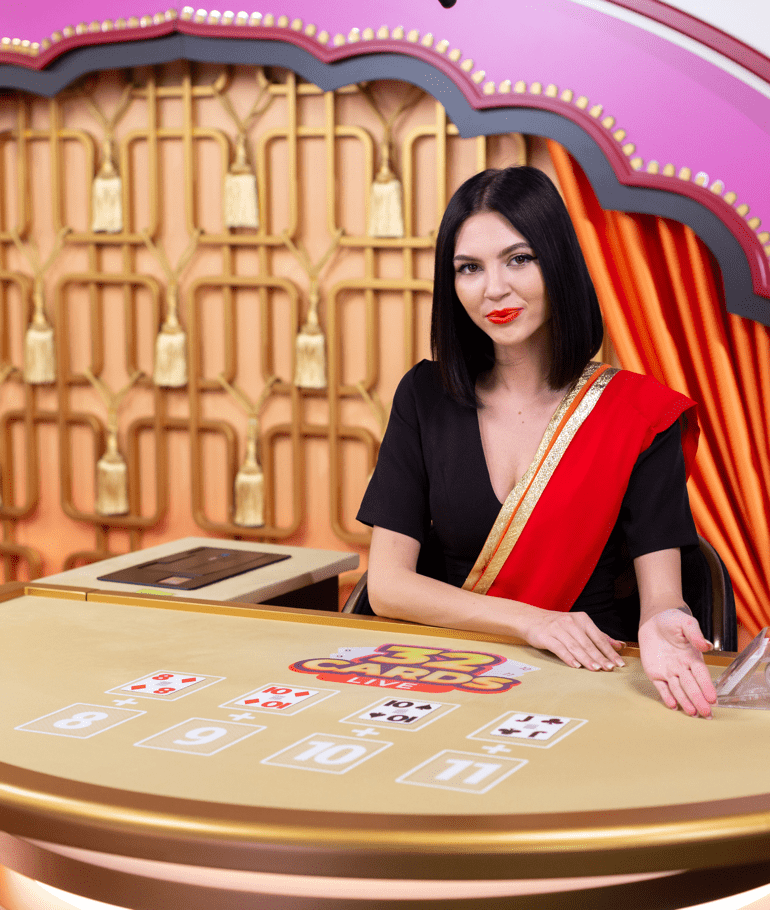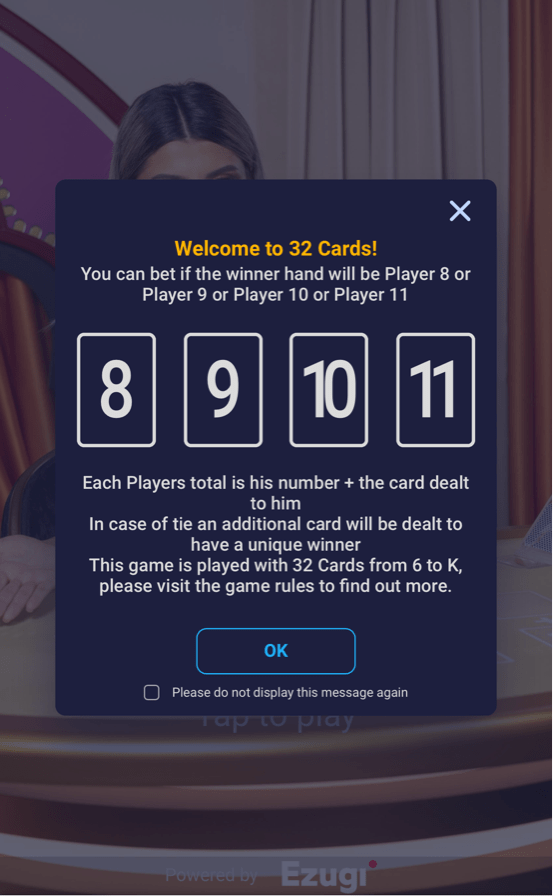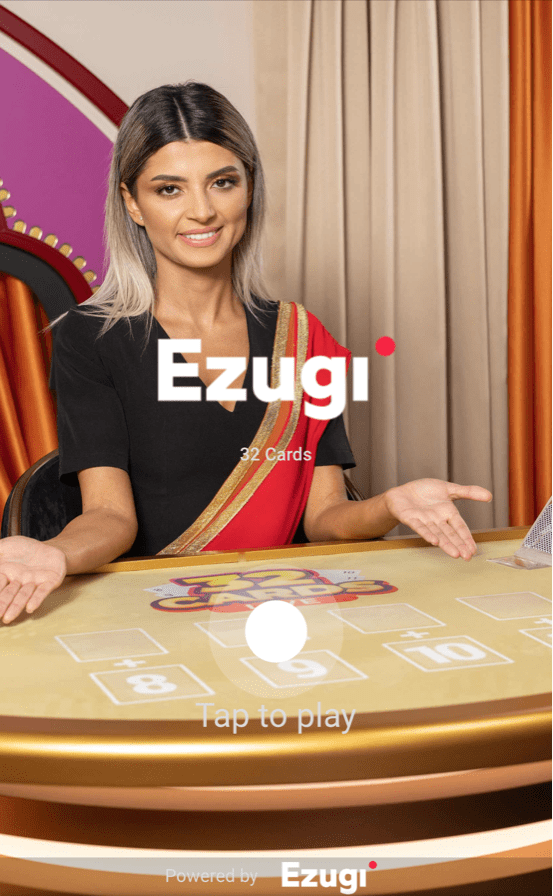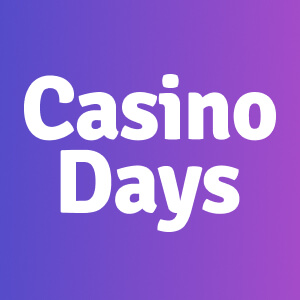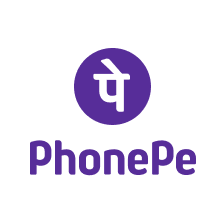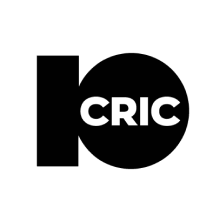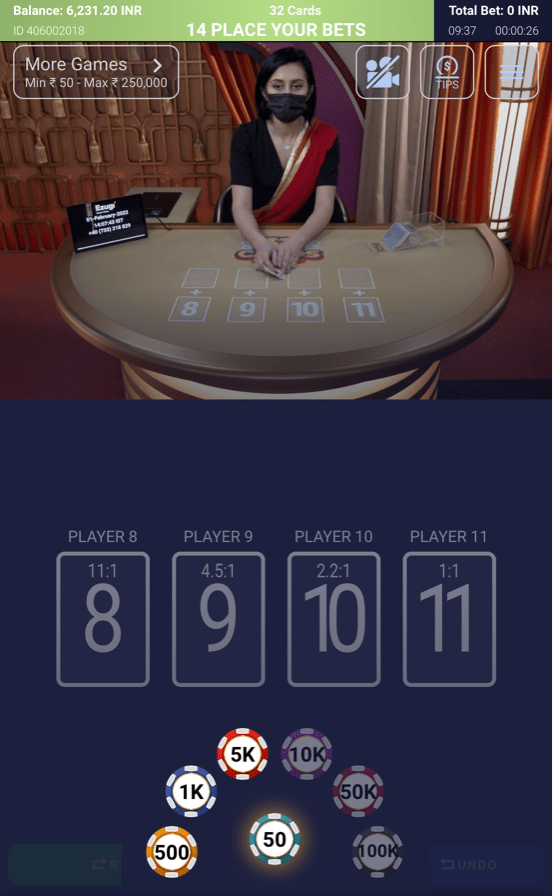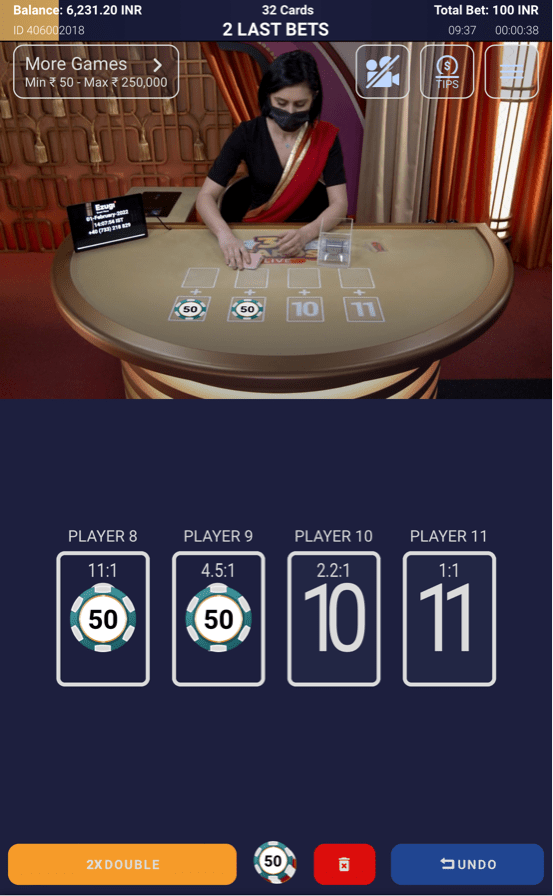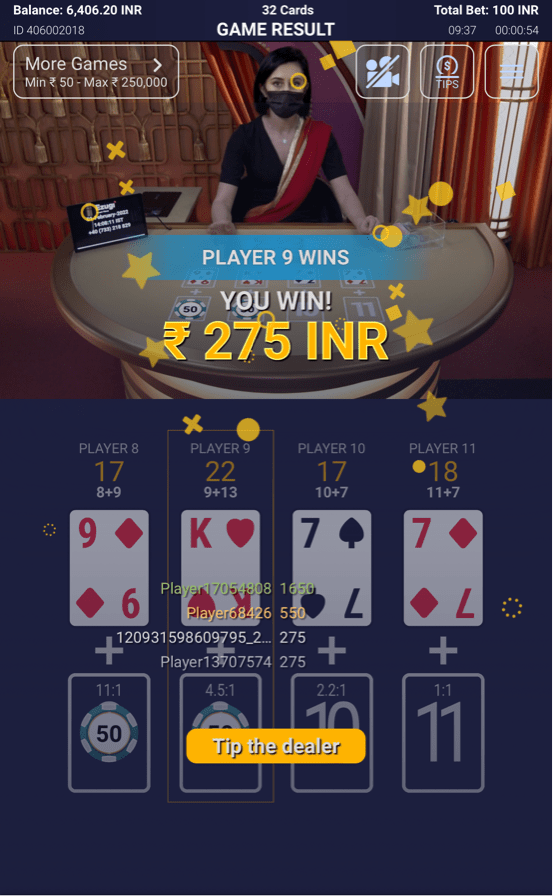32 Cards by Ezugi
32 Cards is an exciting game from Ezugi. Ezugi created this game with Indian players in mind. 32 Cards has become a true success story among Indian players online almost from the get-go.
You play this game from a stripped deck with only 32 cards. The cards left from the original deck are ranging from 6 up to King. To win in 32 Cards you have to predict the winning hand.
Several people online can take part in this game at the same time since you play against the casino. If you haven’t played this real money game, please continue reading this review of 32 Cards.

32 Cards Game Intro 
32 Cards Start Screen
Indian online casinos with 32 Cards
You can play 32 Cards using the web and mobile on any live casino in India as long as the casino has Ezugi’s software. A downloadable app isn’t required.
For the best Indian online casinos with 32 Cards, please follow the list below. These casinos have secure and quick payments through PayTM, UPI, Netbanking, Visa and Mastercard. Some of them also support RuPay as well as Crypto Payments and popular e-wallets.
32 Cards game Rules
32 Cards is a luck-based casino game that anyone can learn to play. You definitely don’t have to be an ace gambler to understand this game.
As the name implies, this game uses 32 cards. Your goal is to guess which of the 4 playing hands will get the highest total.
Each of the four-hand starts with default points, either 8, 9, 10 or 11. The default hands will together with one extra card make up the winning hand.
To take part in the game you can bet on one or more hands. The payout varies on how many points the hands starts with. We’ll look at the payout further down in this review.
The smallest bet for 32 Cards is ₹50 and the largest bet is ₹2,50,000.
The four starting hands and betting options
Ezugi has simplified the hands by calling them players. So you “bet” on the player hands.
- Player 8: starts with 8 points
- Player 9: starts with 9 points
- Player 10: starts with 10 points
- Player 11: starts with 11 points
Card Values
All cards with a numerical value, 60 to 10, has the same point as their face values.
Jack scores 11 points, Queen 12, and King is the highest with 13 points.
Playing and how to win in 32 Cards
The game starts with the betting round. Again, you bet on one or more players to guess which player will get the highest score.
In the next step, the dealer gives an extra card to all 4 players. To calculate the final score you combine the default player points and the value of the dealt card.

32 Cards Betting Interface 
32 Cards Placing a Wager 
32 Cards Winning Bet
An example game of 32 Cards can look like this:
- Player 8 is dealt a 10. Final score is 8+10 = 18.
- Player 9 is dealt a king. Final score is 9+13 = 22.
- Player 10 is dealt a Jack. Final is 10+11 = 21.
- Player 11 is dealt a 7. Final score is 11+7 = 18.
In this example, all casino players who placed a bet on Player 9 to win would have won real money.
What happens in a tie during a game of 32 Cards?
If the two higher hands have identical scores, the dealer will deal one more card to each player. Further extra cards will be dealt to the tied players until there is one winner.
Lower scoring players that ties can not receive extra cards.
32 Card payouts and RTP
The payout structure of 32 Cards pays higher rewards for the lowest starting Player hand. The highest starting hand doubles your money.
32 Cards pay table
| Bet type | Payout |
|---|---|
| Player 8 | 11:1 |
| Player 9 | 4.5:1 |
| Player 10 | 2.2:1 |
| Player 11 | 1:1 |
32 Cards RTP
Since both the starting score and the payout for the different player hands are different there’s also a different return to the wagers.
In the long run, it’s always going to pay more if you only bet in Player 8 because of the return on the bet. Player 11 will pay out more often since that hand always is starting with 11 points.
32 Cards RTP table
Since both the starting score and the payout for the different player hands are different there’s also a different return to the wagers.
In the long run, it’s always going to pay more if you only bet in Player 8 because of the return on the bet. Player 11 will pay out more often since that hand always is starting with 11 points.
| Bet type | RTP |
|---|---|
| Player 8 | 93.99% |
| Player 9 | 90.09% |
| Player 10 | 93.77% |
| Player 11 | 92.97% |
32 Card dealers
Although the card game was produced for an Indian audience all dealers in 32 Cards speak English. But the dealer’s attire has some Indian influences. The female dealers wear a red sari sash with a golden stripe whilst the male dealers wear a similarly coloured scarf.
The 32 Card dealers stream live from Ezugi’s live studio in Romania.
Other live games online that are easy to learn
If you like easy games where you don’t have to go too deep into betting strategies we recommend Andar Bahar, Crazy Time and Mega Ball.
If you’re more into deeper strategy games, you’ll always find Roulette, Blackjack and Baccarat in the online casinos. Visit our games review page for the most popular live casino games.
Published on August 6, 2021 by Matt Brown. Last updated: February 1, 2022
